 BERLIN, GERMANY, March 20, 2017 (Berliner Zeitung, translated from German): The Ganesha temple in Neukoelln’s Hasenheide Park, planned to become Germany’s largest. In 2006 hopes were high to finish the temple construction, punctually for soccer’s World Cup. But nothing came of it. In 2007, the faithful celebrated the solemn beginning of construction with priests from India flown in for the event. The former Neukoellner mayor Heinz Buschkowsky also sat happily among the incense sticks and flowers. Buschkowsky had ensured that the Hindu society received the lease on the Hasenheide site.
BERLIN, GERMANY, March 20, 2017 (Berliner Zeitung, translated from German): The Ganesha temple in Neukoelln’s Hasenheide Park, planned to become Germany’s largest. In 2006 hopes were high to finish the temple construction, punctually for soccer’s World Cup. But nothing came of it. In 2007, the faithful celebrated the solemn beginning of construction with priests from India flown in for the event. The former Neukoellner mayor Heinz Buschkowsky also sat happily among the incense sticks and flowers. Buschkowsky had ensured that the Hindu society received the lease on the Hasenheide site.
The temple still does not exist today. Only the 56 foot high entrance portal has been finished. The architect, an Indian temple builder, traveled to his homeland last October when Germany became too cold for him. In April he will return. Of course there have been a number of serious problems in the past few years, most quite earthly. The Indian temple builders were not well acquainted with German construction law. The Neukoelln authorities expressed their unhappiness about the slow progress on the construction site. Next year the building permit expires. By then the temple must stand, at least as a shell.
Vilvanathan Krishnamurty is standing in front of the scaffolding and looks up. “We have already come a long way,” says the 64-year-old temple founder and vice president of Sri Ganesha Hindu Temple. Krishnamurty smiles. Not a word of anger because the construction is going so slowly, no swearing over the delays, no dissatisfaction. “The gods set the pace,” says Krishnamurty. Specifically, Ganesha. “He has patience. Ganesha works slowly, and that’s normal. “Sometimes it takes 20 years. In Britz there is also a Hindu temple. The construction lasted for five years there. “It is dedicated to God Murugan,” says Krishnamurty. “Murugan is fast, he’s in a hurry.” It’s that simple.





